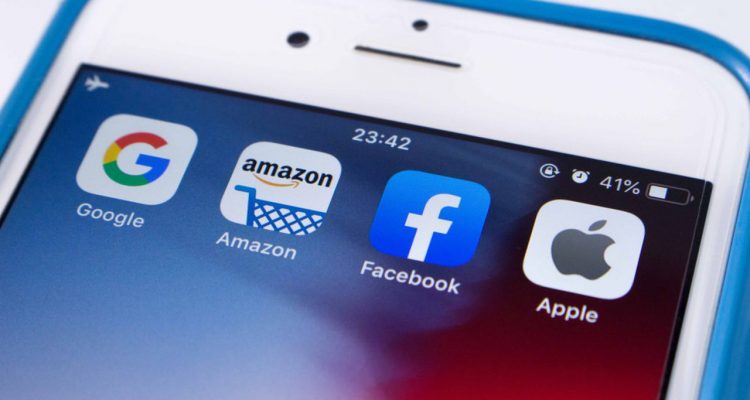GAFA simply represents the four (04) most powerful companies in the digital world: Google, Apple, Facebook and Amazon. An “M” referring to Microsoft is sometimes attached to this acronym. These giants of Silicon Valley have taken a prominent place in our daily lives and have even “given birth” to little ones called NATU: Netflix, Airbnb, Tesla and Uber. GAFA represent the economy of the 21st century!
Do GAFAs get tangled up?
When they arrived, each GAFA had its market. Indeed, Google targeted research and advertising, Apple electronics, Facebook social networks and finally Amazon e-commerce. Each had a virtual monopoly on its market. But that was before. Today the GAFA are marching on the flower beds. In fact, today, GAFAs are skipping the line on anything that seems profitable to them: the financial sector is the toy they are fighting over (cryptocurrency, payment services …)
| Sectors | Apple | Amazon | ||
| Advertising and
e-commerce |
X | X | X | X |
| Banking services | X | X | X | X |
| Online hosting | X | X | ||
| Streaming, Home appliances, health | X | X | X | |
| Operating system | X | X |
Africa, the new GAFA hunting ground
According to Daniel Ives, “There is clearly an opportunity for companies like Facebook and Google to establish themselves and make their mark on African soil.” In their quest for growth, it is an essential strategic choice to look to Africa, which will have a quarter of the world’s population within 30 years.
Amazon and Apple for the moment are still in the observation phase, unlike Google and Facebook, which have no lack of imagination to integrate the African market. As for Microsoft, it is a must at the institutional level by providing its products and services on the technological level. Almost all governments are in collaboration with him.
Google and Facebook in Africa
Google has already been providing its “help” in Africa for quite a while. And this, through:
- Support for nearly one hundred thousand developers;
- Support for around sixty Tech start-ups;
- Offer of doctoral scholarships (for digital professions);
- Awareness campaigns on digital issues;
- Actions aimed at reducing the costs of Internet access for the underprivileged.
Accra (Ghana) has been chosen by Google for its first research laboratory specializing in AI (Artificial Intelligence). On the other hand, the “Equiano” project, which is scheduled for construction in 2021, will also be funded by Google, with the aim of monitoring the data that will transit from North America to Africa.
For its part, 23 African countries are in Facebook’s sights. To the latter, they intend to offer free internet access (via their Free Basics service). They are also developing a submarine cable project called “Simba”.
On the way to cybercolonization?
Africa wants to catch up on the technological level, and artificial intelligence seems to be the solution allowing it to bridge the gap between it and other continents. Many initiatives of the scientific community and African entrepreneurs are progressing with great difficulty, for lack of resources. Left to their own devices, African entrepreneurs and researchers have no other choice but to turn to GAFA.
This option does not just present a risk for African entrepreneurs, who will participate in the development and profit of non-African actors, but a real problem for African governments. In the sense that the GAFA not only capture the brains recruited but also absorb data from the continent through their applications and services. In short, it is an exploitation of local resources while attracting added value to their economy: in other words, cybercolonization.
Africa’s strong potential, coupled with its apparent lethargy present it as easy prey. It thus places itself at the heart of GAFA’s desires, on the lookout for this market. African economies seem to be unable to afford artificial intelligence, something the GAFAs want to give them, well that’s what one might say. On the other hand, you could easily think that this is just a seductive situation. Will governments regularize the sector quickly enough or will research be favored to the detriment of the privacy of Africans? Does the strong presence of Chinese champions such as Huawei or ZTE stimulate the willingness of GAFA to invest in Africa?
Perhaps there are opportunities for private people to invest in the sector and (who knows?) To get the upper hand in GAFA which is not yet well established in Africa. What do you think ?


Leave a Reply